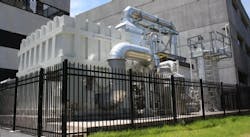FuelCell Energy Providing Carbonate FC System to Capture CO2 at ExxonMobil Dutch Refinery
A Dutch refinery facility will test next-gen and integrated carbon capture and power generation technology under a new collaboration between an oil production giant and a hydrogen-focused fuel cell company.
ExxonMobil affiliate Esso Nederland BV will build a pilot plant at its Rotterdam Manufacturing Complex to test carbonate fuel cell technology developed by FuelCell Energy. The goal is to create electricity and heat meeting on-site demand and capturing carbon dioxide (CO2) at the same time.
Carbonate fuel cell technology such as FuelCell Energy’s power plant model are aimed at reducing emissions and raising the efficiency of fossil-based heavy industrial facilities where the energy density need is too high for intermittent resources. FuelCell’s H2-based technology is designed to create power for on-site applications such as combined heat and power (CHP) plants and microgrids, among others.
The Rotterdam pilot project will study the costs and performance of a carbonate fuel cell plant utilized for carbon capture. The CO2 captured would be transported and stored permanently under the North Sea in collaboration with another project.
Carbonate fuel cells are designed to capture CO2 emissions from industrial processes before they are released in the atmosphere. The carbon capture methods are still highly expensive and not scaled industry-wide or globally, but proponents such as ExxonMobil, Esso Nederland BV and FuelCell Energy hope the pilots such as this can offer productive paths forward.
“FuelCell Energy and ExxonMobil believe that capturing carbon at the source is an efficient way to decarbonize heavy industry,” FuelCell Energy CEO Jason Few said in a statement. “This technology can capture carbon and produce electricity simultaneously, making it a game-changer for the industry.”
Chart the Many Paths to Net Zero via Microgrids
Microgrid 2024 Happening April 22-24 in Baltimore
Sessions Include Hydrogen, Renewables, Battery Storage and RNG
The Esso Nederland Rotterdam pilot project is being co-funded by the European Union under the Emissions Trading System Innovation Fund and by the Netherlands Enterprise Agency via a Demonstration Energy and Climate Innovation grant.
Houston-based ExxonMobil is the largest U.S. oil and gas producer at more than 2.4 million barrels of oil and gas liquids and 8.3 billion cubic feet of natural gas per day. In 2021, the oil giant announced it was investing more than $3 billion in carbon capture through projects in Texas, Singapore, Qatar and the Netherlands.
Hydrogen, which traditionally is generated either by steam reforming of methane gas or by electrolyzers splitting the H2 from water, does not contain carbon in its chain and thus does not emit CO2 when combusted. The U.S. Department of Energy and private entities such as FuelCell Energy are exploring its scalability into a utility-scale resource.
“The unique advantage of this (FuelCell Energy) technology is that it not only captures CO2 but also produces low carbon power, heat and hydrogen as co-products,” Geoff Richardson, senior vice president of commercial and business development for ExxonMobil’s Low Carbon Solutions, said in a statement. “We are excited for the opportunity to pilot this innovation at our own Rotterdam facility.”
The Rotterdam Manufacturing Complex produces petroleum-based products for the transportation, lubrication and chemical industries. The site is also integrated with a co-located hydrogen plant operated by Air Products.
In September, FuelCell Energy announced completion of its Tri-Gen System project to produce renewable electricity, hydrogen and water, from directed biogas within the Toyota operations at the Port of Long Beach.
About the Author
Rod Walton, EnergyTech Managing Editor
Managing Editor
For EnergyTech editorial inquiries, please contact Managing Editor Rod Walton at [email protected].
Rod Walton has spent 17 years covering the energy industry as a newspaper and trade journalist. He formerly was energy writer and business editor at the Tulsa World. Later, he spent six years covering the electricity power sector for Pennwell and Clarion Events. He joined Endeavor and EnergyTech in November 2021.
Walton earned his Bachelors degree in journalism from the University of Oklahoma. His career stops include the Moore American, Bartlesville Examiner-Enterprise, Wagoner Tribune and Tulsa World.
EnergyTech is focused on the mission critical and large-scale energy users and their sustainability and resiliency goals. These include the commercial and industrial sectors, as well as the military, universities, data centers and microgrids. The C&I sectors together account for close to 30 percent of greenhouse gas emissions in the U.S.
He was named Managing Editor for Microgrid Knowledge and EnergyTech starting July 1, 2023
Many large-scale energy users such as Fortune 500 companies, and mission-critical users such as military bases, universities, healthcare facilities, public safety and data centers, shifting their energy priorities to reach net-zero carbon goals within the coming decades. These include plans for renewable energy power purchase agreements, but also on-site resiliency projects such as microgrids, combined heat and power, rooftop solar, energy storage, digitalization and building efficiency upgrades.

